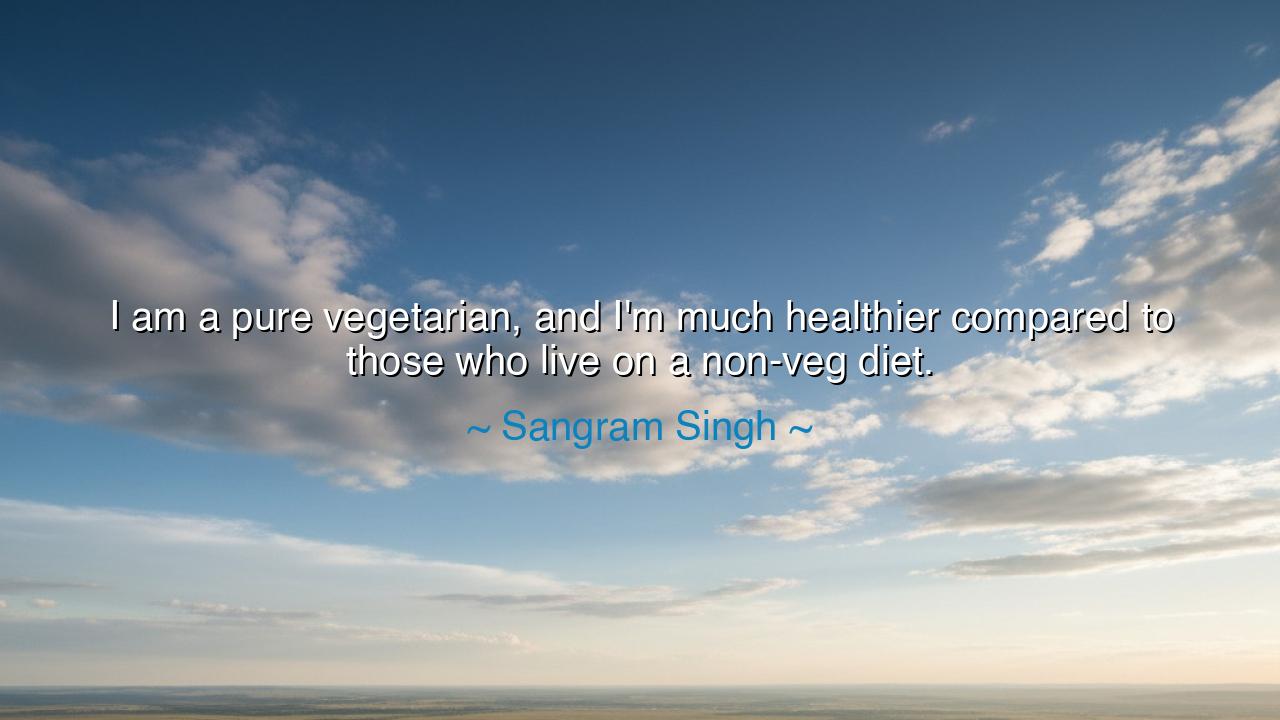
I am a pure vegetarian, and I'm much healthier compared to those
I am a pure vegetarian, and I'm much healthier compared to those who live on a non-veg diet.






"I am a pure vegetarian, and I'm much healthier compared to those who live on a non-veg diet." These words, spoken by Sangram Singh, carry with them not just a statement of personal health, but a profound reflection on the ancient belief that what we consume shapes not only the body but the spirit. Singh’s commitment to a vegetarian diet is rooted in a deep understanding of how food can either elevate or weigh down our being. The idea that a plant-based diet leads to greater health and vitality is not a modern notion, but one that has been passed down through millennia by philosophers, healers, and spiritual leaders.
In the ancient world, the concept of diet was intimately tied to balance and purity. The Greeks, renowned for their focus on both the body and the mind, placed great importance on the idea of moderation in all things, including food. Pythagoras, the great philosopher and mathematician, famously espoused a vegetarian lifestyle, believing that abstaining from meat helped in maintaining a clear mind and a harmonious soul. For Pythagoras, eating plants rather than animals was not just a dietary choice, but a spiritual practice, one that aligned the individual with the natural rhythms of the universe. This ancient wisdom echoes Singh’s words—a vegetarian diet, in many ways, fosters a healthier, more balanced life.
The ancient Indians, too, understood the deep connection between food and spiritual health. Ahimsa, the principle of non-violence, was central to many of their teachings, and it extended to the food one ate. Gandhi, the great leader and spiritual teacher, advocated for a vegetarian diet, believing that consuming meat could bring about a spiritual imbalance, for it required the death of another living being. To Gandhi and many others, the act of eating meat was not just about nutrition, but about ethics—about how our choices impact not only our own health, but the world around us. For them, a vegetarian diet was an embodiment of compassion and purity, both for the body and the soul.
Consider the example of the Buddha, who, in his teachings, emphasized the importance of mindful living and balance. It is said that the Buddha practiced vegetarianism, as he believed that abstaining from the killing of animals was part of leading a life of peace and compassion. The Buddha’s teachings about diet were rooted in the belief that a mind free from the clouds of excess—whether in food or thought—was one that could attain true clarity and wisdom. Just as the Buddha chose to eat simply, so too did Singh, who believes that the clarity of mind and vitality of the body are nurtured through plant-based nutrition.
The Romans also understood the importance of moderation and balance in diet. While they were famous for their lavish feasts, Roman philosophers like Cicero often wrote about the importance of self-control and discipline in the pursuit of health and virtue. To Cicero, and many of his peers, the best way to maintain physical and mental health was through a simple, moderate diet, emphasizing vegetables and whole grains, while limiting excess. Their approach to food was based on the idea that what we consume should nurture both the body and the spirit, not weigh it down with indulgence. Singh’s vegetarian diet, like the Romans’ balanced meals, focuses on simplicity and purity, helping to maintain a strong body without unnecessary excess.
The lesson in Sangram Singh’s words is clear: what we eat shapes the essence of who we are. Diet is not just about nutrition, but about how it nourishes our mind, our spirit, and our relationships with others and the world. By choosing a vegetarian diet, Singh aligns himself with ancient principles that advocate for purity, compassion, and balance. It’s not just about eating what makes us feel good in the moment, but about making choices that support long-term well-being—choices that keep our bodies energized, our minds clear, and our spirits calm.
In practical terms, Singh’s commitment to vegetarianism invites us to consider how we fuel our bodies in relation to the greater good. Are our food choices aligning with the principles of compassion, balance, and clarity? Are we nourishing our bodies with foods that sustain us and honor the world around us? Like the ancients, we can learn to make food choices that reflect not only what is best for our physical health, but also for our spiritual and ethical well-being. A vegetarian diet, in this light, becomes not just a personal choice, but a reflection of how we choose to engage with the world and our role in it.
Thus, the wisdom of Sangram Singh and the ancients calls us to live with awareness, compassion, and discipline in every aspect of our lives, including the food we eat. Let us choose a diet that nurtures not just the body, but the spirit, one that helps us live with balance, clarity, and purpose. Whether we adopt a vegetarian diet or simply strive for more mindful choices, let us nourish our bodies in a way that promotes long-term vitality, well-being, and a deeper connection to the natural world and all living beings. In this way, we honor the ancient wisdom of purity, compassion, and balance, and live lives of true health.






AAdministratorAdministrator
Welcome, honored guests. Please leave a comment, we will respond soon